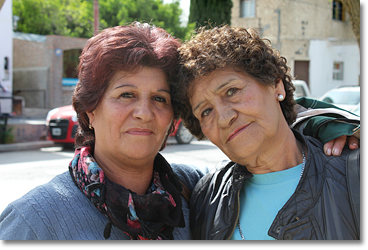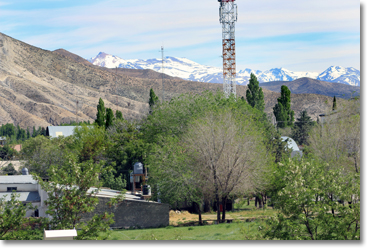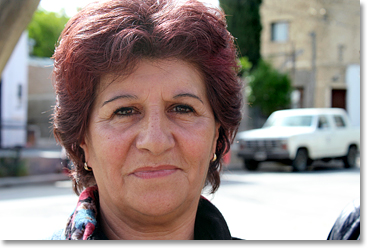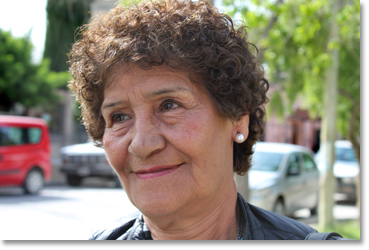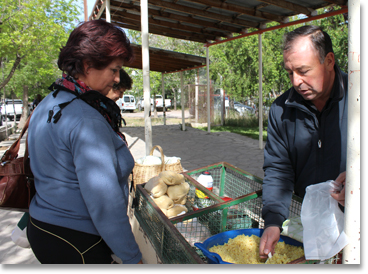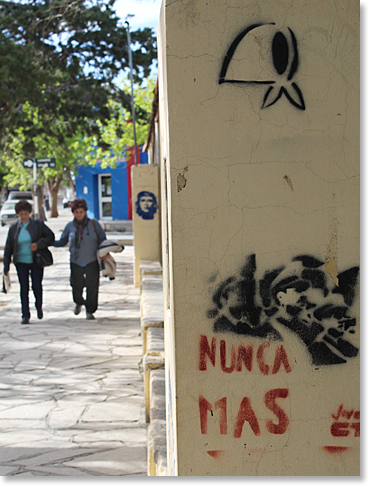|
Interview with Nilda Elisa Tapia
Quick Links:
Everything that has to do with nature In Motion Magazine: Could you please talk a little about La Mesa Campesina del Norte Neuquino? Nilda Elisa Tapia: Yes. La Mesa Campesina is a group of people, you see, who came together to do something, to seek out, to help those who have problems with their land, with their water, everything that has to do with nature. You have lawyers; you have agronomy engineers. The majority who are with La Mesa are agronomy engineers. There are young people who know a lot and they help us who know less – who have less knowledge of -- how can I explain? – we have less knowledge about the laws, knowledge about how to confront certain problems that we have with powerful people who want to climb to the top. They have extensive knowledge about that and they help us a lot. It is a very well organized group. In other words, it is an organization and it is in many places: Neuquén, San Luis, Mendoza, Cordoba, San Juan, Santiago del Estero. We have a lot of respect for them, and well, this is the way that it is in various parts, you see, and well, I can tell that we are very proud to belong to La Mesa Campesina. We know that there are many people, clearly, the politicians above all, who do not like us. But why don’t they like us, La Mesa Campesina? Because La Mesa Campesina shakes them up a little. It makes them come down to earth because they don’t care about contamination, contaminating the environment, contaminating the water, contaminating the land, contaminating what would be the fruit. And what La Mesa Campesina does is defend all these things. In Motion Magazine: And yourselves? Are you campesinas? Nilda Elisa Tapia: We are campesinas from birth. In Motion Magazine: Yes? Nilda Elisa Tapia: From birth. In Motion Magazine: Where? Nilda Elisa Tapia: We were born in the Tungar. It is a spot about 90 kilometers from here in Chos Malal. And all the land around there has a great deal of oil. In Motion Magazine: Now? Nilda Elisa Tapia: Now – and it’s always had it. It has petroleum and it has gas. So what is it that happens because of this? Everyone comes. A lot of people come interested in wanting to take that land for themselves. But we arrived 143 years ago, more or less, since campesino families have lived there. And the peasant families who live there are the Tapia family, the Escalonas, and the Moyas -- and well, some other people have appeared. How can I explain it to you? There are many who don’t know how to read. There are others who perhaps know a little. But as you can see, for me it is difficult since I have a sixth grade education. I’ve lived, I’ve been living in Neuquén. She (editor’s note: Nilda refers to her sister Olga) lives in the city in Buta Ranquil with my brother, and I live in Neuquén. So, the fact of living in a city is like the mind works more. You learn lots of things, perhaps, because you see it on television, you read it in magazines. But the country people, no, because their minds are on the animals; on the water, if enough water will be coming to water their plants; the chickens, if they laid the eggs or didn’t lay eggs; worrying that the little goats don’t get eaten by large outside beasts. And so, they don’t labor too much with their head -- and they remain there with their minds as if asleep. Then along comes a smooth operator, right? And he talks to them, and talks to them, and talks to them, and they come in, and they say all these pretty things to them. “You are going to have this,” and they are going to give you that. And afterwards, they pass them a piece of paper, and they sign it – and that is what happens. Thus, they trick them. Pay for everything with goat hides In Motion Magazine: And what kinds of animals or crops does (did) your family work with? Nilda Elisa Tapia: We have goats, horses, chickens, geese. We have all that. Cattle, no, because cattle, you see, need greener fields and ours are very rugged, right? Like dry. It is very dry in those parts, even though we have the Tromen volcano that’s there. But it’s dry; these are dry lands. In Motion Magazine: And do plants grow (there)? Nilda Elisa Tapia: Plants grow, but all that is wild growth. You are not going to plant there and then suddenly it will give you (crops). No, no, no they are lands that as I said to you, are very rugged. We used to exchange it for merchandise In Motion Magazine: Can you talk about your connection to the land? Nilda Elisa Tapia: It is the prettiest. It is beautiful because we grew up there. For example, when I was a young girl, my mother and them, of course the older generation, would plant potatoes, corn, wheat, barley; and afterwards would come, pumpkin, onion, parsley, cilantro, red peppers, peas. Peas, you know, we ate a lot of salad with peas and eggs. All of that was harvested there in the field. (And) my father used to go, I remember, he used to go to town, once a month, by horse and he would bring ... In Motion Magazine: By horse? Nilda Elisa Tapia: By horse, because we were 22 kilometers from the place I am talking about. It was 22 kilometers from where I was born to the town. And my father would travel this distance by horse and he would bring back a sack of flour, ten kilos of sugar, ten kilos of herbs. And my father would barter for it with the business owner of the boliche (a shop or grocery store), as they used to call it. They use to call it boliche, they didn’t call it business as they do now, or (distribution center). They would call it boliche. In Motion Magazine: Boliche? Nilda Elisa Tapia: Why boliche? Because they used to have everything -- socks, shoes, everything. And you used to pay with goat hides. In Motion Magazine: It was a big market? Nilda Elisa Tapia: It was of course like a big market and this big market was owned by the Helene family. The Helene family are Turks and, well, they used to buy from us hides of all types: goat, deer, fox, rabbit, everything. We used to exchange them for merchandise and my father used to return on -- well, there wasn’t a car or a truck that would bring him -- so he used to come back on a burro. They would load it with two large suitcases, and well, they would put everything in there, he would tie it really well, and he would come home like that. The only things we would buy there was that: flour, yerba, sugar, noodles, rice and nothing more because we had everything else here -- we had it in the countryside. And the thing that is happening now is that the country folk are now for the most part the old folks, since the youth, because of work or wanting to study, leave for the city. You see? And then once they go to the city, they end up half liking it and they stay, but the day that they realize just what the country is -- it’s going to be too late. It is going to be too late because, because you saw, that in the city -- I’m one who lives in Neuquén and it costs a lot. If you don’t have a good job you can’t support yourself, you can’t sustain yourself. Everything is very expensive, everything, and you go half a block and you have to have money in your hand, half a block and you must bring money because if you don’t you’re good for nothing. Olga Tapia: Where I live in Buta Ranquil I have a garden, they call it a garden, and I plant onion, parsley, garlic, for my own use. You don’t want to be needing a leaf of parsley and have to go out and buy it, no. I have a little piece of land there, and I make do. Nilda Elisa Tapia: And look what I have to pay for that. (Editor: Earlier in the day, Nilda and Olga bought some food from a street-side stall -- see photo.) I paid 30 pesos. Thirty pesos for a kilo of mote. What they call mote is wheat that you harvest, you separate the grain and boil it in an ash-glazed pot. You boil it and you make the mote. Yes, that is how my mother made it, but since the old lady is not around anymore, we haven’t eaten mote anymore, we have to buy it, you see. You see? In Motion Magazine: What are some of the problems with the land, now? Nilda Elisa Tapia: We -- for example -- in the place where we were born, and from where we went to school, we had our whole lives there. There’s a whole life’s history there, in that land. That land has been usurped. That is how we describe it - "usurped". In Motion Magazine: Your land? Nilda Elisa Tapia: Yes, yes, yes, my land, because before the era of the Conquest of the Desert (Editor: the Conquest of the Desert was a military campaign by Argentina to conquer Patagonia.) these lands were used to pay the generals, they paid the generals with land. Well, there was so much of it that I believe that there’s more than one that probably doesn’t even know that that land exists. When my father arrived in that land, that land already belonged to Anchorena. (Editor: The Anchorena family was one of the early land-holding families of Argentina). It already had an owner, but there was nothing there. It was bare land with nothing at all. It was weeds, brush, and nothing more. My father when he arrived there he cleared some hectares. He cleared it completely and began to plant. He began to sow plants. He began to sow alfalfa. Well, everything I was telling you is what we used to harvest there. And a little adobe house was made there and it was the first little adobe house that my father built. I was born there. She (Olga) was born in the town, in Buta Ranquil. She is the richer one (laughter). People who have lived all their life in the country In Motion Magazine: Do you have a connection with the Indigenous people in this area? Nilda Elisa Tapia: Yes, yes we are in contact with them because the same thing that has happened to us has happened to them -- that their lands have been seized because there is petroleum there and they have been removed. The saddest thing of all is, (this is happening) to people who have lived all their life in the country, all their life. Right? And the government, the provincial government does nothing to stop all this, because, fine, there’s work, there’s a lot of people who work in oil, but come on, give the people a chance to participate, including the Mapuche, the Indigenous people, the Mapuche most of all. “Look, I am going to make you a well here, but you are going to receive so much.” Right? Make them part, let them have a share. No, they are to go. They remove them from the land with their animals and “Good luck to you”, but they don’t give them anything. Wherever they can go and get a little piece of land to live, that’s where you have to go because they remove you or begin to lock you up, to lock you up because they, for some time now, they’ve been surrounding the perimeter with barbed wire, with whatever they can use, and presto, you are locked inside. And the animals -- what will they eat? No, it is terrible. It is terrible, terrible what they are doing and above all I blame it on the provincial government for closing its eyes, because the provincial government has seen all of this. They know what a country person (peasant) is. It knows what a livestock migration trail is, transhumancia, as you say. It knows what it is but it does nothing. It does nothing and washes its little hands. In Motion Magazine: Is there anything else you would like to say? Nilda Elisa Tapia: Well, yes. I would like to end by telling you that this guy who seized our land, he is making a claim against us for seizing the land! He says that we seized the land, that we are the usurpers. We are the accused as the defendants and he is looking at us from the outside like no big deal. Does that seem right to you? I was born there. I went to school there. He didn’t. He never lived in this place -- never. And we know that he has paid people who are illiterate, who don’t know what they’re doing. And so, he has paid them to be his witness, so that they testify that he lived there, and he did not live there. He never lived there. But there is money to be made -- and is this right? Is this right? I don’t think so? In Motion Magazine: Thank you.
|
||||||||||||||||||||||||||
If you have any thoughts on this or would like to contribute to an ongoing discussion in the  What is New? || Affirmative Action || Art Changes || Autonomy: Chiapas - California || Community Images || Education Rights || E-mail, Opinions and Discussion || En español || Essays from Ireland || Global Eyes || Healthcare || Human Rights/Civil Rights || Piri Thomas || Photo of the Week || QA: Interviews || Region || Rural America || Search || Donate || To be notified of new articles || Survey || In Motion Magazine's Store || In Motion Magazine Staff || In Unity Book of Photos || Links Around The World NPC Productions Copyright © 1995-2017 NPC Productions as a compilation. All Rights Reserved. |


